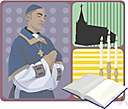bibliolatry
Also found in: Thesaurus, Wikipedia.
bib·li·ol·a·try
(bĭb′lē-ŏl′ə-trē)n.
1. Excessive adherence to a literal interpretation of the Bible.
2. Extreme devotion to or concern with books.
bib′li·ol′a·ter n.
bib′li·ol′a·trous adj.
American Heritage® Dictionary of the English Language, Fifth Edition. Copyright © 2016 by Houghton Mifflin Harcourt Publishing Company. Published by Houghton Mifflin Harcourt Publishing Company. All rights reserved.
bibliolatry
(ˌbɪblɪˈɒlətrɪ)n
1. (Theology) excessive devotion to or reliance on the Bible
2. extreme fondness for books
Collins English Dictionary – Complete and Unabridged, 12th Edition 2014 © HarperCollins Publishers 1991, 1994, 1998, 2000, 2003, 2006, 2007, 2009, 2011, 2014
bib•li•ol•a•try
(ˌbɪb liˈɒl ə tri)n.
1. excessive reverence for the Bible as literally interpreted.
2. extravagant devotion to books.
[1755–65]
bib`li•ol′a•ter, bib`li•ol′a•trist, n.
bib`li•ol′a•trous, adj.
Random House Kernerman Webster's College Dictionary, © 2010 K Dictionaries Ltd. Copyright 2005, 1997, 1991 by Random House, Inc. All rights reserved.
bibliolatry
the worship of books, especially the Bible.
See also: Books-Ologies & -Isms. Copyright 2008 The Gale Group, Inc. All rights reserved.
ThesaurusAntonymsRelated WordsSynonymsLegend:
Switch to new thesaurus
| Noun | 1. |  bibliolatry - the worship of the Bible bibliolatry - the worship of the Bible |
Based on WordNet 3.0, Farlex clipart collection. © 2003-2012 Princeton University, Farlex Inc.